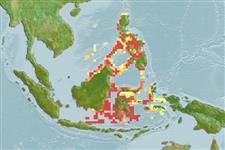Teleostei (teleosts) >
Blenniiformes (Blennies) >
Blenniidae (Combtooth blennies) > Salariinae
Etymology: Ecsenius: Greek, exenios, -os, -on = uncontrolled, immoderate.
Environment: milieu / climate zone / depth range / distribution range
Ecology
Marine; reef-associated; depth range 1 - 15 m (Ref. 48636). Tropical; 19°N - 7°S, 112°E - 131°E
Western Pacific: known only from the Philippines and the adjacent northeast Borneo (Sabah), Malaysia.
Size / Weight / Age
Maturity: Lm ? range ? - ? cm
Max length : 4.5 cm TL male/unsexed; (Ref. 48636); 2.7 cm SL (female)
Very similar to Ecsenius cf bandanus, but readily identified by the double black spots on the abdominal region (Ref. 48636).
Adults occur on reef crests and slopes with rich coral growth to a depth of about 15 m (Ref. 48636). Often solitary and around sponges and tunicates (Ref. 90102). Oviparous. Eggs are demersal and adhesive (Ref. 205), and are attached to the substrate via a filamentous, adhesive pad or pedestal (Ref. 94114). Larvae are planktonic, often found in shallow, coastal waters (Ref. 94114).
Life cycle and mating behavior
Maturity | Reproduction | Spawning | Eggs | Fecundity | Larvae
Oviparous, distinct pairing (Ref. 205).
Springer, V.G., 1988. The Indo-Pacific blenniid fish genus Ecsenius. Smithson. Contrib. Zool. (465):134 p. (Ref. 5296)
IUCN Red List Status (Ref. 130435: Version 2024-1)
Threat to humans
Harmless
Human uses
Fisheries: commercial; aquarium: commercial
Tools
Can't connect to MySQL database fbquizv2. Errorcode: Too many connections
